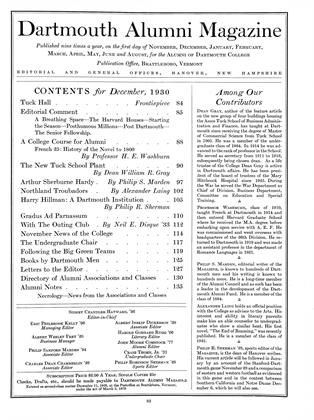For the actual mechanics of the game, here is that first period story. Morton had been duelling with Barry Wood of Harvard in a kicking game, the Green quarterback gaining on each exchange, and the tip-off came when Morton placed a kick out of bounds on the Harvard six-inch line. Wood, standing in his end zone, kicked out to the 37yard line and the Dartmouth offensive started when Ward Donner, a young sophomore who had suddenly been advanced four notches in the rating just before the game, skirted through tackle for 14 yards. A few bangs at the line and Dartmouth uncorked its little dinky behind-the-line forward pass—from Wolff to Donner—which was good for a gain to the Harvard four-yard line. With a first down in sight, Dartmouth needed only two plunges for touchdown, first Sutton and then Morton crashing the heart of the Crimson line. When Shep' Wolff kicked the goal, the game was oyer as far as the Dartmouth scoring was concerned, and the Green cagily battled it out with Harvard, getting only one scare for their strategy the remainder of the afternoon. That was when Wild William McCall was sent into the game and had one of his kicks blocked by Vic Harding on the Dartmouth 27-yard line. Perhaps McCall may have beenV'cold" and perhaps he may not have had time to become acclimated to the steady rain, but the ball bounded off Hard ing's chest and rolled crazily into the end zone.
The reports of that play are still not clear. I remember seeing the loose ball bounding through the end zone with Harding in mad pursuit but his was a losing race, for the ball continued on off the playing field and Harding finally captured it—outside the end zone. Other reports say that McCall, quick as a flash, took out a Harvard man in the end zone who might have reached the ball for a Harvard touchdown. Pandemonium reigned and Capt. Ben Tickiior trotted with the ball to the two-yard line, "where trys for points after touchdown are made, but the officials ruled the play rightly a safety and Dartmouth had escaped with only a two-point deficit, the first points scored upon her to that date.
This game showed what Dartmouth had in a real test. The line was rated as one of the strongest in the East and the backfield did all that could be expected under such conditions. Reserves were the keynote of the Dartmouth success as far as running went, for the Green had uncovered a couple of new players in Ward Donner and Red Porter who looked to be sure-fire material.
The drive was on for Yale, and to my knowledge no mention of the Yale jinx was brought up by our band of writers, although the fact had to come out in metropolitan papers. But there was a different feeling about this Yale-Dartmouth game; it was a feeling of a hard fought game, but there were no mental hysterics and heroes to write about and the slogan of "taking the game in stride" was the one which permeated Hanover. By that it was not meant that Dartmouth meant to win the game by a large score, or even possibly to win the game at all, but that the Green expected the game to be as any normally scheduled contest.
BILL MORTON '32, QUARTER
PAUL CREHAN *3l, TACKLE
 View Full Issue
View Full Issue
More From This Issue
-
 Article
ArticleThe New Tuck School Plant
December 1930 By Dean William R. Gray -
 Article
ArticleDirectory of Alumni Associations and Classes
December 1930 -
 Article
ArticleArthur Sherburne Hardy
December 1930 By Philip S. Marden -
 Article
ArticleHarry Hillman: A Dartmouth Institution
December 1930 By Phil Sherman -
 Lettter from the Editor
Lettter from the EditorEditorial Comment
December 1930 -
 Class Notes
Class NotesCLASS OF 1923
December 1930 By Truman T. Metzel
Sports
-
 Sports
SportsFRESHMAN BASEBALL
June, 1923 -
 Sports
SportsR. J. MICHELINI '27 ELECTED NEXT YEAR'S VARSITY BALL LEADER
August, 1925 -
 Sports
SportsWINTER SPORTS
April 1926 -
 Sports
SportsThe Lavery Almanac
November 1980 By Brad Hills '65 -
 Sports
SportsWith Big Green Teams
January 1944 By Dick Gilman '45 -
 Sports
SportsTHE FOOTBALL SEASON OF 1924
January, 1925 By Professor James P. Richardson '99


